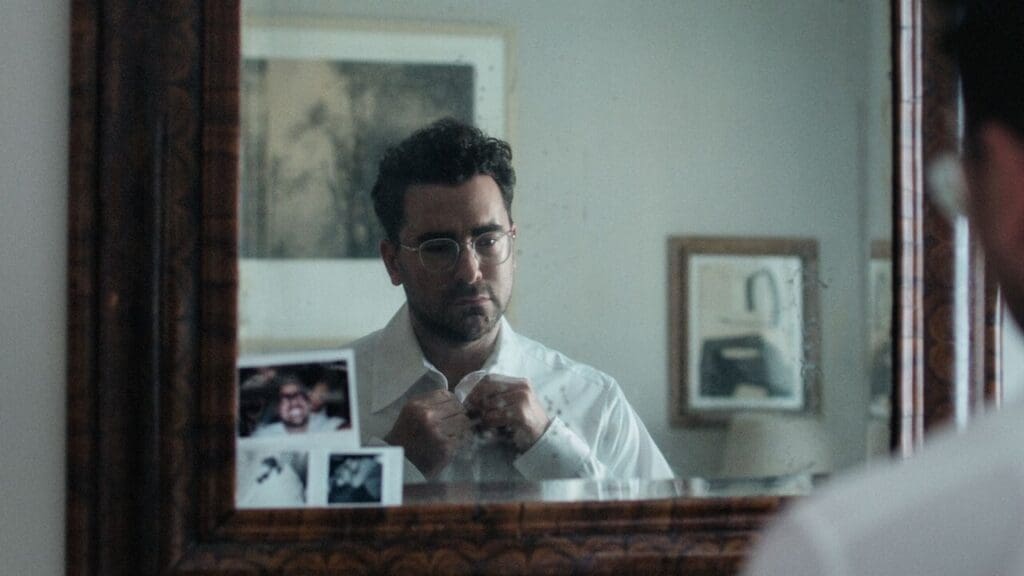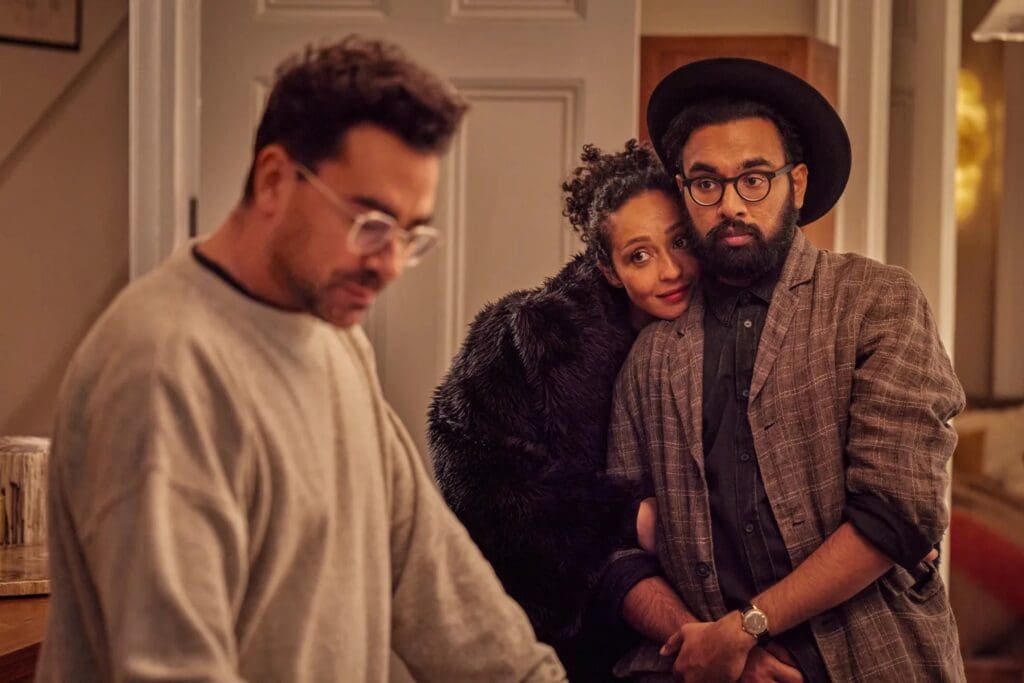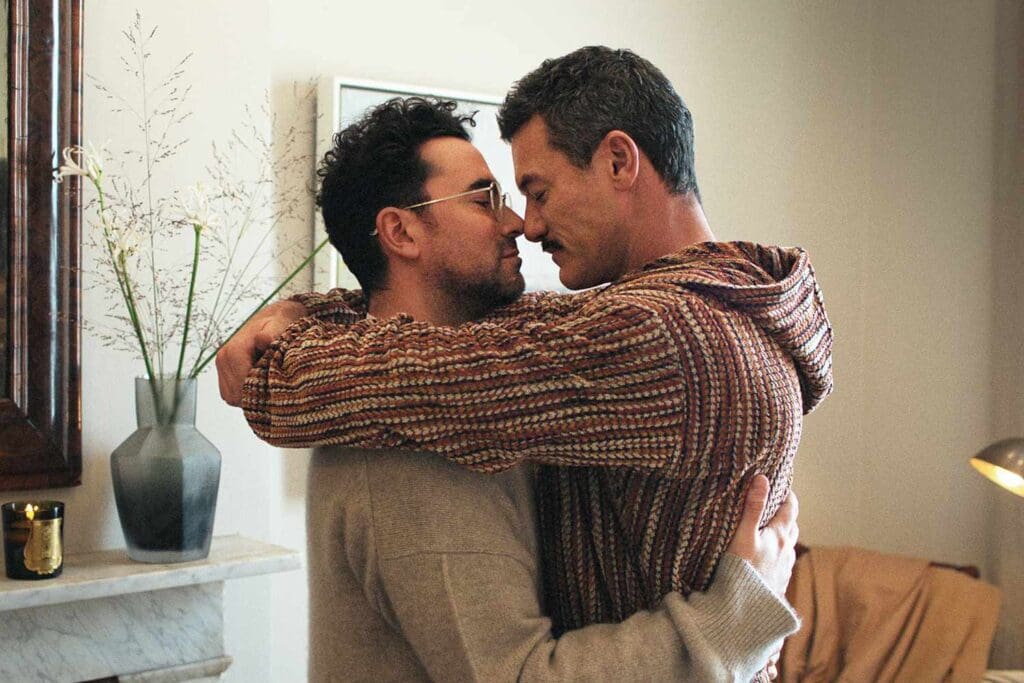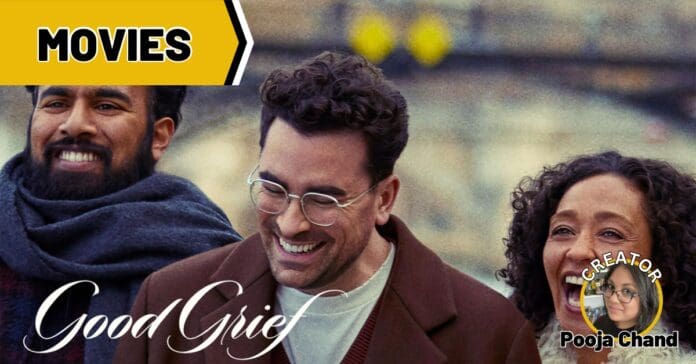Share this
As film and television continues to expand on unique and diverse stories, we’ve been hit with more and more LGBTQ-focused stories as well. But like any genre or represented group, the media can be hit or miss with audiences. And specifically with queer stories, they can sometimes be repetitive, too focused on discovering one’s identity and coming out, or can place queer characters under harmful stereotypes or in overly sexualized settings. However, thanks to the acting, directing, and writing talents of Dan Levy, we have a refreshing story about queer romance and life in his newest Netflix film, Good Grief.
Good Grief follows Marc, an artist who is mourning the loss of his husband, Oliver after a tragic accident with the help of his two best friends. In the process of handling his affairs, Marc discovers more about himself and the secrets his husband kept, while coming to terms with who he is and who he wants to be as a person, a friend, and spouse of a deceased loved one. The film stars Dan Levy, Himesh Patel, Ruth Negga, Luke Evans, and Arnaud Valois.

No matter the circumstance, loss and grief is something everyone experiences on some level. It could be the passing of a spouse or immediate family member, the ending of a relationship or friendship, or just the severance of connection between you and something you thought was permanent or would last forever. Regardless of what or who it is we grieve for, people are always bound to discover new things or parts of themselves they never saw beforehand. And while the truth may be difficult to grapple with, it’s oftentimes the one thing we need to face in order to move forward and accept what is.
And this is precisely the thought and theme that is discussed heavily throughout Good Grief. At its core, the film is about learning to pick up the pieces and clean up the messes left behind that you may not have expected before your life combusted. Through the main character, Marc, we are able to experience both the joy and the immense pain of memories and new information simultaneously, without being offered the chance to prepare ourselves mentally. But the film isn’t just about the relationship Marc once held with his late husband. It also hones in on the relationship he has with himself and the people with whom he surrounds himself, specifically his best friends Sophie and Thomas.

There comes a point in all our lives where the process of grieving can take its toll on others, especially those who give us as much of their time as they can. And in some cases, it is easy to take that for granted. In fact, it is also so easy to forget that others who are trying to help are also in moments of grieving. All of this is something that we see consistently through not just the way Dan Levy portrays the character of Marc, but the way he is written and the interactions we see him having with other people. The film sits the audience down and reminds us that it is ok to mourn and grieve for as long as we need to. But ultimately, difficult truths need to be addressed and sometimes, they are better tackled together than alone.
At times, Good Grief can feel as if it is dragging its feet to get to the finale, particularly as conflicts and minor twists seem to pop up left and right without a pause. But to balance this out, the film shines with the script and dialogue into which Levy pours gallons of emotion and depth that makes the film heavy, and for some, incredibly cathartic. The film acts immediately to get to the reason why this story exists at all and the dialogue is full of Levy’s classic quips and one-liners that do remind us of his comedic talent. The only thing that helps brings the story to life are the heart shattering performances from our main cast.

With Dan Levy, Himesh Patel, and Ruth Negga, there is a clear chemistry that makes their friendship feel natural and realistic as adults in their 30’s still struggling to find footing in their lives. And considering how rare it is to find stories about queer people in different stages of their lives, whether they be unfortunately widowed, enjoying the single life, or just simply to live. We don’t get enough stories that are just about queer people existing in the circumstances they are thrown in, regardless of genre. And for Good Grief to walk in nonchalantly as a drama film with comedic relief featuring gay characters is an absolute breath of fresh air.

Good Grief isn’t the easiest film to watch, particularly if you’ve experienced loss, or are easily triggered by emotional and heavy themes. But just because it isn’t easy doesn’t mean it isn’t worth the watch. And that is the entire point of the film. Just because life isn’t easy, or some relationships turned out to be something you didn’t expect, or you struggle to cope with the reality of life’s circumstances, doesn’t mean it’s not all worthwhile. Through its well-written characters, Good Grief reminds us to move forward at your pace, to accept the help offered to you, but to not take advantage of others while you are processing your grief. Not to mention, it doesn’t hurt to have another LGBTQ story under the belt with multidimensional characters that hold stories of emotional depth. After all, in being human, grief is both inevitable and universal, but can be good for self-growth, and Good Grief is proof of that.
Samosa Rating:
Good Grief receives 4 out of 5 Samosas.
Good Grief is now streaming on Netflix.
Runtime: 1h 40m
If you want even more film discussions, reviews, or just some good old recommendations, be sure to follow @samosasandpopcorn on TikTok!


